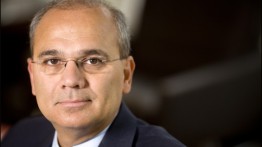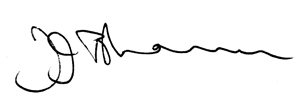Update from President Bharucha: A Framework for Action
POSTED ON: April 24, 2012

Read President Jamshed Bharucha’s April 24, 2012 letter to the community below, and CU Alumni Association President Peter Cafiero's follow-up letter.
Dear Students, Faculty, Staff, Alumni and Friends:
As I enter the final stretch of my first year as President of Cooper Union, I am gratified that we have made tremendous progress in our discussions about its future. Two objectives have guided our work: to position Cooper Union for continued academic distinction in the future, and to place the institution on a financially sustainable course.
A framework for action
In its interim report, the Revenue Task Force has recommended that we explore fee-based academic programs that build on our unique strengths, while preserving, at least for now, full scholarships in our three core undergraduate programs. In this hybrid framework, new fee-based programs may include master’s and other professional programs, on-line programs, continuing education, partnerships, and interdisciplinary programs that integrate our schools in powerful ways. Many other entrepreneurial ideas are being discussed by members of our community, which hold the promise of both academic and financial benefit.
Through the disciplined work of the Expense Reduction Task Force, we have identified an immediate budget reduction strategy. The strategy reflects differential growth rates of academic and administrative areas relative to the Higher Education Price Index (HEPI) over the past six years. The budget for fiscal year 2012-2013 will be reduced by approximately $4 million. As is appropriate, reductions will come disproportionately from administrative operations. The zero-base budget process we have adopted is intended to ensure that all spending is in support of our educational priorities. Many thoughtful ideas have come forward to reduce expenses, and some, such as Dean Baker, have even volunteered to take cuts in their budgets, mobilize their organizations to raise resources and find alternative ways to operate.
The Board of Trustees has authorized moving forward with planning new programs consistent with this framework, and has approved next year’s budget based on the reductions mentioned above. Full-tuition scholarships will be assured for all students entering our three core undergraduate programs this fall (as previously announced)—and also for the class entering in the fall of 2013. Our capacity to sustain our scholarship program will be tied to our success in generating additional revenues from new programs, as well as from philanthropy.
We now move forward with planning and implementation in line with this bold framework. We will engage in a continuous strategic planning process. As we implement initiatives, we will assess our financial progress, making changes as necessary. We must be creative but also be assured that our institution is secure. Administrative and academic reviews are still ongoing. I am grateful to the members of the two task forces, even as they embark upon writing their final reports. I also want to thank everyone who has engaged in our vigorous discussions, in scores of formal and informal settings.
We recognize the difficulty in generating revenues on the scale needed and in the time required. But the harder we work and the more we collaborate, the further we will go and the better our options will be in the future.
Over the past nine months, I have had the privilege of meeting with and learning from students, faculty, alumni, staff and friends. I have described our financial situation and have listened to diverse voices. I have met with officials at the city, state and national level. And I have worked to extend our philanthropic and reputational reach.
As this new hybrid framework began taking shape, I have been soliciting feedback whenever possible. I believe that this framework has broad support. Some members of the Cooper Union community are focused on the exciting prospect of introducing initiatives that could vault Cooper Union into new leadership roles in art, design and technology as our city, our nation and the world undergo rapid transformation. Others are focused on the chance to preserve full scholarships for our three core undergraduate programs.
As with any form of change, this framework has its detractors. Some are concerned that new programs may not generate sufficient revenue and that an immediate revision of our scholarship policy is necessary. Others are opposed to charging tuition of any kind, even for graduate programs. Our preliminary financial analysis shows starkly that new, reliable and scalable streams of revenue are imperative - over and beyond what an ambitious fundraising strategy may be relied upon to yield, and sooner than a set of options with long term promise can deliver. Weighing all the alternatives, I am convinced that some fee-based programs are necessary for Cooper Union’s solvency, and that this framework gives us the most optimistic way forward. Because we have a short runway to get these programs going, failing to act now will put the institution in peril.
Many obstacles lie in our path. But this path is worth fighting for. It provides the impetus to innovate academically at a time when higher education faces unprecedented challenges and opportunities, and it offers the hope of minimizing the impact on our core programs while we launch new ones.
Culture of philanthropy
At the same time, we must work together to foster a culture of philanthropy, in the spirit of Peter Cooper, who championed philanthropy and led by example. Each generation benefits from those who precede them, and secures the institution for those who follow. We have recruited a team of experienced development professionals who are striving to achieve our highest philanthropic potential by employing best practices.
Our investment in development is paying off. Participation of alumni in the Annual Fund for the fiscal year to date (July 1 to April 23) is up 31 percent (relative to the same time last year) to 2,597 donors out of 12,726 active alumni, yielding a participation rate of 20.4 percent. Total giving is up 32 percent to $1,568,842. Funds donated by parents during the same period are up 73 percent to $288,192, while contributions from friends are up 78 percent to $169,153. Overall giving to the annual fund is up 37 percent to over $2.3 million. I want to thank all those who have stepped up with their generosity.
I am deeply moved by a fundraising drive launched by our students. Fifty five percent have participated, including more than three quarters of the undergraduates in engineering and architecture - generating $2,652 to date. In addition, the Senior Gift campaign is underway, and has generated another $7,148 to date. Seniors set an ambitious goal of $37,500—equivalent to a full scholarship for one student for the 2011-2012 academic year. Seniors already have earned a match from three alumni on the first $5,000 they raised, bringing the Senior Gift to more than $11,000 so far.
In this spirit, I am pleased to pledge 5 percent of my base salary to the Annual Fund. I urge you to contribute to the Annual Fund if you haven’t already done so. All gifts, of any size, count toward our participation rate. The alumni participation rate is especially critical when we seek support from donors outside the Cooper family.
Thank you for your support and creativity as we energize the institution for the decades ahead and place it on a firm financial footing.
Sincerely,
Jamshed Bharucha
President




